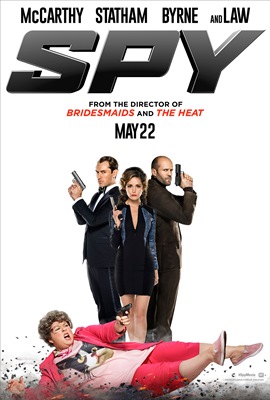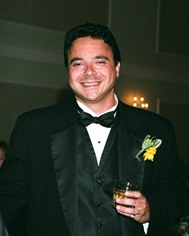 You don’t walk into “Spy” without wanting to see Melissa McCarthy, especially when she’s being directed by Paul Feig. Director Feig and McCarthy work well together, as evidenced in “Bridesmaids” (which earned her an Oscar nomination) and “The Heat,” which paired her as a tough, acid-tongued detective opposite Sandra Bullock’s straight-laced FBI agent in the cop-buddy film we’ve all become accustomed to seeing yet were nonetheless able to enjoy through their characters’ genuine comedic chemistry.
You don’t walk into “Spy” without wanting to see Melissa McCarthy, especially when she’s being directed by Paul Feig. Director Feig and McCarthy work well together, as evidenced in “Bridesmaids” (which earned her an Oscar nomination) and “The Heat,” which paired her as a tough, acid-tongued detective opposite Sandra Bullock’s straight-laced FBI agent in the cop-buddy film we’ve all become accustomed to seeing yet were nonetheless able to enjoy through their characters’ genuine comedic chemistry.
“Spy,” a spoof of the James Bond films we’ve loved for over fifty years, is Feig and McCarthy’s attempt to make three times of working together another charm. For the most part, they succeed. The surprising strength of “Spy” lies in its screenplay’s structure, which paces and plays out the formulaic Bond storyline with an exceptional eye-to-detail in which Feig and McCarthy are able to deftly add their particular brand of humor. In this strength, however, lies “Spy’s” partial downfall- a third act weakened by an overlong comedic conclusion that overplays the action and violence-induced resolution we’re used to seeing. However, given this understandable shortcoming (action and violence aren’t Feig and McCarthy’s fortes), the chemistry between McCarthy and her co-stars are enough of a diversionary tactic to make “Spy” a pleasant summer movie-going experience.
McCarthy plays Susan Cooper, a decade-long CIA-surveillance analyst who aids field agents on their missions, essentially being the eyes in the back of their heads. Her surveillance is primarily given to Bradley Fine (Jude Law), a tuxedo-clad super agent whom Cooper secretly pines for and, in his present mission, Fine is sent to uncover the whereabouts of a nuclear weapon about to be sold on the black market. As Fine’s covert missions to save the world take him to exotic locales, Cooper alerts him to enemies behind corners via camera and radio contact from her desk within the bowels of a rat and bat-infested CIA office building basement. When Fine’s current assignment to find the nuke goes awry and it’s revealed that all of the CIA field agents’ covers are blown, Cooper volunteers to pick up Fine’s mission as an undercover operative and find the weapon herself. While the CIA director (Allison Janney) gives the idea consideration, rough-and-tumble field agent Richard Ford (Jason Statham) scoffs at the idea of a frumpy, middle-aged civil servant doing his job. After the director views an old training tape in which Cooper is surprisingly able to handle herself in hand-to-hand combat, permission is granted and Cooper enters the field with the assignment to ‘track and report’ only. Seeing this as a chance to move into the glamorous upper echelon of the spy game and prove herself to her colleagues and also to her beloved agent Fine, Cooper finds herself confronted by the very comedic caveat Ford hinted at: she is given the unglamorous cover of a frumpy, middle-aged woman.
Everyone loves rooting for the underdog, and McCarthy makes you root for her. Misunderstood, stuck in a dead-end job, wanting to be appreciated, wanting to prove herself worthy of love from someone clearly out of her league- it’s all there. Combined with the frustration she exhibits in sarcastic one-liners and a boundless energy that transcends any physical dexterity or skill, McCarthy infuses her character with a drive and likeability not seen since the late John Candy, who was always able to create comedic audaciousness while maintaining an underlying sweetness. While their physicality may have dictated their specific comedic slants, both McCarthy and Candy portray characters with such a smart, sweet internal straightness that it’s tough for any audience not to connect with them.
This likability doesn’t always play out well- remember Candy’s “Who’s Harry Crumb?” But if the story supports the talent, as “Spy” does for McCarthy, then all is forgiven. With good comedic moments between characters and a supporting cast that includes Rose Byrne as a haughty, temperamental baddie (a rougher version of her “Bridesmaids” role) and Miranda Hart as Nancy, Cooper’s analyst ally who gives their relationship a dynamic similar to that of Melanie Griffith and Joan Cusack in “Working Girl,” “Spy” overcomes its faults with a smart story structure and is able to maintain its charm. Like its main character, “Spy’s” a spoof that’s better than most- while employing a diversionary tactic to get the job done, it succeeds by creating a genuine effort to entertain without dumbing itself down.
